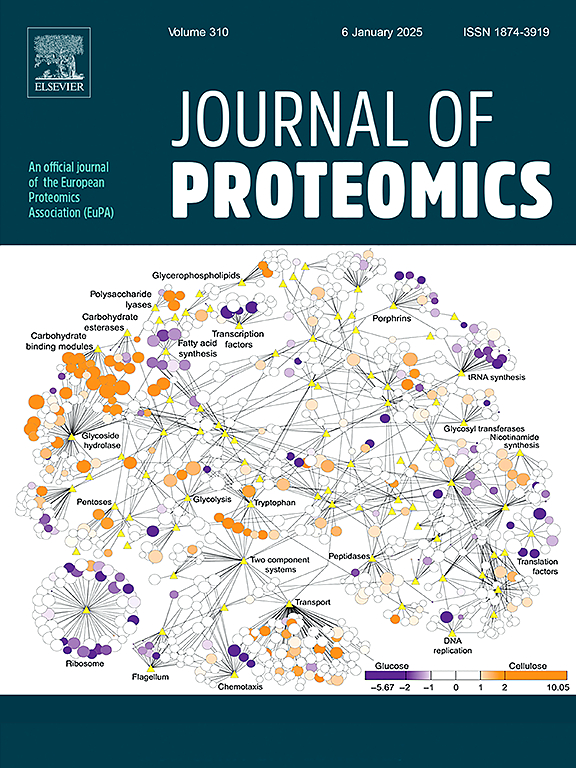蛋白质组学和代谢组学分析揭示了大麻二酚对革兰氏阳性细菌的抗菌机制
IF 2.8
2区 生物学
Q2 BIOCHEMICAL RESEARCH METHODS
引用次数: 0
摘要
大麻二酚(CBD)是从大麻中分离出来的主要非精神活性大麻素,具有良好的抗菌作用。然而,CBD的抗菌机制仍然知之甚少。本研究采用细菌抑制实验、无标记蛋白质组学和非靶向代谢组学研究其作用机制,选择革兰氏阳性细菌代表为地衣芽孢杆菌(B. licheniformis)、金黄色葡萄球菌(S. aureus)和屎肠球菌(E. faecium)。结果表明,CBD对细菌细胞壁和细胞膜造成明显的损伤,导致蛋白质组学和代谢谱发生显著变化。具体来说,地衣芽孢杆菌、金黄色葡萄球菌和粪芽孢杆菌中分别有437、120和195种蛋白以及52、153和94种代谢物的差异表达。CBD的抗菌机制与先前已知的抗菌剂(如青霉素和头孢菌素)有相似之处,特别是在影响细菌细胞壁方面,但在具体的作用方式上有所不同。CBD扰乱了初级和次级代谢物的生物合成,改变了细菌的代谢,有助于其抗菌活性。该研究为CBD的抗菌机制提供了有价值的见解,支持其作为抗生素替代品的潜在发展及其在食品安全方面的应用。意义寻找抗生素替代品,减轻病原菌对食品安全的影响,减少抗生素的使用至关重要。CBD是从大麻中提取的主要非精神活性大麻素,具有良好的抗菌作用。然而,CBD的抗菌机制尚未得到很好的阐明。本研究从细胞水平到分子水平深入了解CBD的抗菌机制,将有助于CBD作为一种新型抗菌剂的开发。本文章由计算机程序翻译,如有差异,请以英文原文为准。

Proteomic and metabolomic analyses reveal the antibacterial mechanism of Cannabidiol against gram-positive bacteria
Cannabidiol (CBD), the primary non-psychoactive cannabinoid isolated from cannabis, exhibits promising antibacterial effects. However, the antibacterial mechanism of CBD remains poorly understood. In this study, the mechanism was investigated using bacterial inhibition assays, label-free proteomics, and untargeted metabolomics, with Bacillus licheniformis (B. licheniformis), Staphylococcus aureus (S. aureus), and Enterococcus faecium (E. faecium) selected as representative Gram-positive bacteria. The results revealed that CBD caused significant damage to bacterial cell walls and membranes, leading to notable changes in proteomic and metabolic profiles. Specifically, 437, 120, and 195 proteins, as well as 52, 153, and 94 metabolites, were differentially expressed in B. licheniformis, S. aureus, and E. faecium, respectively. The antimicrobial mechanism of CBD shares similarities with previously known antibacterial agents, such as penicillin and cephalosporins, particularly in affecting the bacterial cell wall, but differs in its detailed mode of action. CBD disrupted the biosynthesis of primary and secondary metabolites and altered bacterial metabolism, contributing to its antibacterial activity. This study provides valuable insights into the antibacterial mechanism of CBD, supporting its potential development as an antibiotic alternative and its application in food safety.
Significance
It is crucial to find alternatives to antibiotics to mitigate the impact of pathogenic bacteria on food safety and reduce the use of antibiotics. CBD is the primary non-psychoactive cannabinoid derived from cannabis, and it has shown promising antibacterial effects. However, the antimicrobial mechanisms of CBD have not been well elucidated. This study provides a deep understanding of the antibacterial mechanism from the cellular to molecular level, which will contribute to the development of CBD as a novel antibacterial agent.
求助全文
通过发布文献求助,成功后即可免费获取论文全文。
去求助
来源期刊

Journal of proteomics
生物-生化研究方法
CiteScore
7.10
自引率
3.00%
发文量
227
审稿时长
73 days
期刊介绍:
Journal of Proteomics is aimed at protein scientists and analytical chemists in the field of proteomics, biomarker discovery, protein analytics, plant proteomics, microbial and animal proteomics, human studies, tissue imaging by mass spectrometry, non-conventional and non-model organism proteomics, and protein bioinformatics. The journal welcomes papers in new and upcoming areas such as metabolomics, genomics, systems biology, toxicogenomics, pharmacoproteomics.
Journal of Proteomics unifies both fundamental scientists and clinicians, and includes translational research. Suggestions for reviews, webinars and thematic issues are welcome.
 求助内容:
求助内容: 应助结果提醒方式:
应助结果提醒方式:


